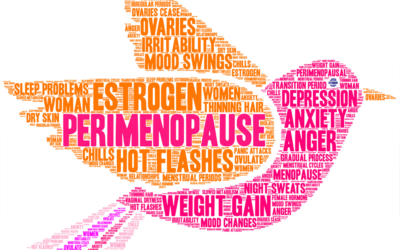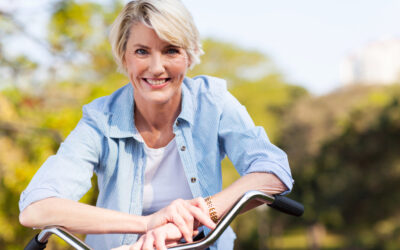

Are You Navigating the Symptoms of Perimenopause?

When I was in my mid-forties I started experiencing a number of seemingly unrelated symptoms – weight gain, brain fog, sore joints, and fatigue. I tried all sorts of one-off fixes – diets, exercise programs, and magic pills – without success. It wasn’t until my period started changing and I experienced hot flashes that the penny dropped and I connected everything to perimenopause. Did it happen like that for you too?
I wonder why there isn’t more talk about perimenopause? After all, it happens to all ladies, although it’s true that some have more challenges with it than others.
Perimenopause (and menopause) is the bookend to puberty, the reproductive part of our lives. So it includes a lot of hormone changes as the reproductive hormones – primarily estrogen and progesterone – naturally decline.
But the real challenge comes with how those changes impact our wellbeing. Like mood swings, inability to sleep, extreme fatigue, joint pain, digestive issues, hot flashes, night sweats, low sex drive and weight gain. What’s up with all that? Why can’t we just wind up our periods and call it a day?
There are two paths for getting help with perimenopause. The medical path and the lifestyle path. Unfortunately, many doctors are not well equipped to help. The American Association of Retired Persons reports most medical schools and residency programs don’t teach physicians in training about menopause. To make matters worse, a recent survey found that just 20% of ob-gyn residency programs provide any kind of menopause training.
When asked, 3 out of 4 ladies reported they did not get adequate treatment when they brought perimenopausal and menopausal concerns to their doctors. And 84% of women say their symptoms interfere with their lives and some are even debilitating.
One of the main areas where doctors should be able to help is in prescribing Hormone Replacement Therapy (HRT). Even though treatment has changed dramatically over the past decade, many doctors are unaware. The new body identical treatment is administered in patches or gel and poses none of the earlier health concerns for breast cancer and heart disease. The topical delivery method means that the liver is completely bypassed, and that absorption through the skin dramatically changes the health risks. Dr. Louise Newson, The Menopause Doctor, goes so far as to encourage women to consider taking body identical HRT for the protections it provides against heart disease, osteoporosis, diabetes and Alzheimer’s.
The other path to get help with the symptoms of perimenopause is through lifestyle. There is a lot that lifestyle habits and behaviors can do to demystify the changes. It turns out the healthy practices of diet and exercise that ladies maintained before perimenopause are unlikely to suit them very well once they enter perimenopause. As our nutrition needs change, so does our digestion. We no longer need all the protein we used to eat, and our sensitivity to sugar and processed foods heightens. Bloating, brain fog, joint pain and weight gain result.
And with hormonal changes to our muscles and joints, the type of exercise and movement that is beneficial also changes. Even if you have always been athletically active, the fatigue and joint pain can make ambitious workouts very difficult. In fact, high impact and anaerobic exercise can cause stress to the system and result in the production of cortisol, the stress hormone. The timing and type of movement you choose take on new importance.
Hormonal changes impact sleep, especially when combined with food choices and stress. So figuring out new sleep hygiene habits are vital to being able to restore the body each night with quality sleep. As we sleep, the body is busy removing dead cells burning fat and rebuilding tissue. The brain catalogues the day’s experiences and builds up memories. Without adequate sleep, the body is stressed when it cannot carry out these maintenance functions and produces cortisol in response. That in turn stimulates appetite, which produces more insulin leading to fat production (and stubbornly stored around the middle). So getting enough good sleep is vital to being able to adapt through the changes of perimenopause.
And finally, mindfulness – getting your head in the game is so important. As it happens, the mind can only focus on one thing at a time. So if you control some of the things you tell yourself and make them positive things, you will benefit from that. Rather than tell yourself that you’re a lazy slob or beat yourself up because you don’t have enough willpower, you tell yourself that you’re an intelligent woman and the goal is achievable. Meditation is a great way to calm the mind, focus on positive things and create endorphins. This can really help to create positivity, reduce cortisol levels and help with sleep.
Are you satisfied with the support your doctor has been giving you for the symptoms of perimenopause? Some symptoms are best resolved using HRT. But many more can be resolved by taking a lifestyle approach.
The beginning of my perimenopausal journey didn’t go well, and I’m determined to help ladies navigate this chapter of their lives so they can take control of the next decades and live their best lives.
To find out how you can navigate the symptoms of perimenopause, click the button to book your free call with Dyna Vink, Health and Nutritional Coach.
Confused About Movement for Health and Exercising for Fitness?

Have you ever thought about what the term ‘fitness’ means to you?
I had never thought that I might have to change my exercise as I got older. But when my body started to complain, I began to think that change was in order. So I started asking questions. I began to see that there was confusion about exercising for ‘fitness’ and exercising for ‘health’.
And there is a real difference between the type of exercise you do for both of these outcomes.
If you want to exercise for ‘fitness’, then you need to increase your oxygen uptake. Basically, that’s how much oxygen you can get into your lungs and muscles. The goal for fitness improvements is to be able to work harder for longer, i.e. to increase your performance you need to improve your muscles’ ability to process oxygen. That’s what your training helps you improve. You are trying to build enough work-load in your training sessions to see improvements in time, speed, power and endurance.
Resting heart rate is a measure of ‘fitness’. That’s what improving your fitness is. When your resting heart rate is lower, then when you are feeling stressed or over-whelmed in your day to day life, having a lower resting heart rate means that your heart isn’t rising as high as it might if you were unfit. When you are ‘fitter’, you are also building your resilience to deal with stress.
But when it comes to your ‘fitness for health’ then that’s different.
If you want to feel healthier, then you can spend more time doing activity which does not have the performance expectations around it. Walking more will improve your health, so will swimming, cycling, rowing, dancing, and yes, even housework!
Other aspects of staying healthy as we age include improved posture and breathing, stretching and flexibility and some resistance training for muscle and bone strength.
The starting point for women in perimenopause and into menopause, is to begin with improving cardiac health. This is why the emphasis is to refocus on aerobic exercise. The research shows that healthy ageing requires a minimum of 150 minutes of moderate activity per week.
When we move our major muscle groups and we breath harder (but not out of breath), then we are exercising aerobically. This means lots of oxygen is getting into our lungs and is being taken to the muscle cells where it gets converted into energy inside an area of the cell called the mitochondria. We have thousands of mitochondrial cells in our body. As we age, the work of the mitochondrial cells to store oxygen and turn food into energy, changes. So, improving the size and number of mitochondria is important for staying healthy as we age.
How do we do this? Through moderate aerobic exercise as compared to more vigorous or an-aerobic exercise. If we do aerobic exercise regularly, then we increase the number and size of these mitochondria inside our muscle and heart cells. What this means for our health, is that we function better.
So now, rather than being competitive, I enjoy almost daily aerobic movement to keep me feeling good. I love how, when I do feel stressed, this type of exercise builds my mental resilience. It doesn’t leave me feeling exhausted like high-intensity exercise used to, especially when I wasn’t sleeping so well.
I hope that you can build your aerobic health and experience this feeling too.
#aginggracefully#wellness#menopausesymptoms #perimenopause #movement

Holistic Nutrition Lifestyle | Copyright © 2025 | All Rights Reserved
“This site is not a part of the Facebook website or Facebook Inc. Additionally, this site is NOT
endorsed by Facebook in any way.
FACEBOOK is a trademark of FACEBOOK, Inc.”